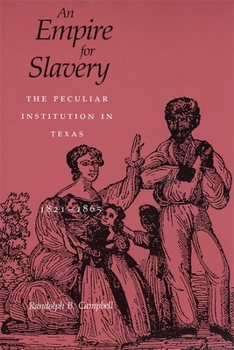Empire for Slavery: The Peculiar Institution in Texas, 1821-1865 (Revised)
Select Format
Select Condition 
Book Overview
Winner of the Coral Horton Tullis, Summerfield G. Roberts, and Friends of the Dallas Public Library Awards
Format:Paperback
Language:English
ISBN:0807117234
ISBN13:9780807117231
Release Date:August 1991
Publisher:LSU Press
Length:320 Pages
Weight:1.00 lbs.
Dimensions:0.7" x 6.1" x 9.0"
Customer Reviews
4 ratings
The Lone Star State Was Founded on Slavery
Published by Thriftbooks.com User , 16 years ago
"Mexico lost Texas by vacillating over slavery." "Texans revolted against Mexican rule in order to protect slavery." Both of these inflammatory simplifications were advanced by contemporary writers in Spanish and English, according to Randolph Campbell, the author of this excellent state history. Campbell is never guilty of oversimplification, though he is to be commended for keeping his scholarly language simple enough for non-professional historians. It's true, as Campbell demonstrates amply, that Mexico vacillated in extending its abolition of slavery to include Texas. Mexico had freed its small population of slaves immediately after independence, but in the 1820s, when Americans began to move into Texas with slaves, Mexico's oft-changing governments were both unable and unwilling to take effective action. But did Mexico lose Texas, or did the American Texans ever truly intend any loyalty to Mexico? Campbell is careful to give thoughtful consideration to both hypotheses. Certainly Mexico's too-late attempts to restrict American immigration, with or without slaves, and to impose effective customs and duties were the immediate precipitants of the Texan rebellion. But Campbell makes it very clear that the slave-holding leaders of the Anglo-Texans regarded the security of their slave ownership as the highest priority in their relationships with Mexico. Once Texas gained its independence, the passage of a constitution that established slavery as a permanent and privileged institution, and the immediate efforts to recruit slave-owning settlers from the American South, clearly expose the underlying motivations of their betrayal of their hosts. From independence until the end of the Civil War, Texas was in every way a slaveocracy on the model of the states of the Cotton Kingdom. The laws governing slave property and slave conduct were copied from the older slave states. The management of slave labor was identical to that of the older states. The economic and social patterns were the same. The transition from independence to statehood was seamless at the level of plantation life. If anything, Texas was precisely the expanding slave economy that its founders foresaw, and Texans were as fiercely committed to the "positive good" conception of slavery as anyone in South Carolina or Georgia. At one point during independence, in fact, a serious proposal was offered, to accept British compensation and investment in exchange for abolition; British leaders expressed interest, but the Texans who suggested the scheme were driven out of the legislature and soon enough out of the state. Texans were not reluctant to join secession. Campbell writes: "...the fundamental reason for disunion was absolutely clear -- it was Negro slavery." Campbell provides solid evidence in his analysis of the Declaration of the Causes which Impel the State of Texas to Secede from the Federal Union: Texas had been settled, the document stated, by people "holding, maintaining and pro
Long Overdue
Published by Thriftbooks.com User , 21 years ago
I found the book to be everything I expected it to be. While doing the research for slavery reconciliation legislation in Texas, I was repeatedly pointed to Professor Campbell and this work for an accurate depiction of slavery in Texas. Because Texas history is glazed with legendary figures and romantic western lore, its complicity in protecting slavery has been quieted. This work is greatly needed so that we will not forget the truth of our past.
great historical study
Published by Thriftbooks.com User , 23 years ago
Professor Campbell brings to light the institution of slavery of slavery in antebellum Texas. Many Texans have no idea of the significant role that slavery played in its beginnings as a nation and a state. Campbell uses hard evidence to support his work (newspapers, census, private letters, first hand accounts, etc.). This work goes into detail about the lives and dealings (literally) of slaves. Several anecdotal instances are given for just about every aspect of slave life. Texas slavery also reflects the slavery practices of other southern US states, so this is handy to have for a study of American slavery in general. Professor Campbell's book is indeed steeped in historical scholarship, but it is nevertheless pleasant to read and easily understood. I highly recommend this book for students(or those interested in) Texas history, the American Antebellum South, or slavery in 19th century America.
"An Empire for Slavery"
Published by Thriftbooks.com User , 24 years ago
This is a great book that introduces the development of Texas and it's history step by step. It starts off with the Mexican government being instable and later wanting to become a dictatorship. Texas was granted land grants from Mexico to settle families in Texas, this got out of hand for Mexico because so many immigrants were coming from the US to settle in their nation. Also bringing slaves, and an introduction to slaves into mexican territory. This later causes the war between mexico and texas, causing thier seperation and a Texas constitution protecting slaves as property. Slaves later became rebellious when Texas was annex into the US and they wanted to be free. Texas later sesseeded from the US and thus resulted in the civil war- a victory for the US granting liberty to all slaves and indentured servants.





